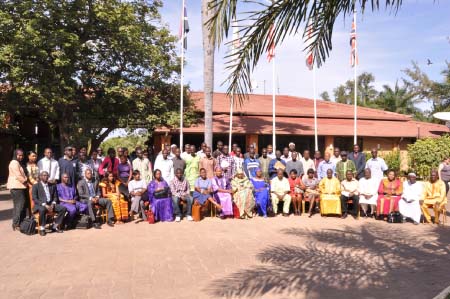
The Local Purchase Order financing product, according to officials, is developed against the background of the structural mismatches inherent in our money market that has omitted the cash conversion cycle and the needs of the suppliers.
In his welcoming remarks at the launching, Mr. Ismailia Faal, Chief Executive Officer of Reliance Financial Services started by giving a brief background of the financial institution, which he said is seven years old this year with a renewed mandate to continue to provide for the lifecycle financial services needs of the clients at the base of economic pyramid.
According to Faal, Reliance Financial Services has achieved significant milestones over the last seven years, some which include a balance sheet size of GMD360 million, customer deposits of GMD230 million, loan portfolio outstanding of GMD75, net equity of GMD55 million, network of 22 branches nationwide and employs 125 young Gambians.
The LPO, he said, is targeted at SMEs who collectively accounts for more than 50 percent of the GDP of the economy. ‘‘There is a challenge of lack of financial and the conventional collateral that besets the suppliers. It is these constraints that microfinance and Reliance sets out to redress within the prudential guidelines of the Central Bank and the risk acceptance limits of Reliance Financial Services,’’ Faal stated.
While expressing his company’s commitment, Faal said Reliance is looking forward to working with the SMEs in The Gambia with a view to avail them the needed finance to empower them to continue their entrepreneurial pursuits and wealth creation.
Reliance, he went on, continue to re-affirm its commitment to the ideals and monetary policy objectives of the Central Bank of The Gambia, which is price and exchange rate stability as well as the Bank prudential mandate of ensuring a safe and sound financial system that continues to breed trust.
In her official launching statement on behalf of the Governor of Central Bank of the Gambia, Mrs. Fatou Deen, deputy Director of Microfinance Department of the Central Bank of the Gambia, said the Central Bank’s participation in this august gathering once more goes to show its unflinching commitment to supporting the development of a viable and sustainable financial sector in the Gambia.
This initiative, she said, is even more worthy of praise as it is borne out of the ingenuity of one of our own home growth financial institutions, Reliance Financial Services.
She stressed that to achieve our economic goals, there is need to create such opportunities for all sectors of the economy to strive and realize their full potentials.
According to her, one of the major pillars of successful financial institution is the provision of innovative products that are demand driven and adequately meet the specific needs of their clientele.
‘‘Good products are the lifeline of financial institutions hence the more pertinent reason to continually seek to create them to add value for their end users,’’ she added.
Madam Deen further stated that the launching of this financing product could not also have come at a more opportune time as many individuals and companies have taken up contract/supply services as their core business.
‘‘This is an emerging markets niche that needs to be nurtured and fully exploited,’’ she said, adding that this product will address the timing and payment patterns of the supply/contract business in the country.
‘’Suppliers will be able to leverage on it to have greater access to working capital to pursue multiple contracts without worrying about having their capital tied up in unpaid supplies,’’ she stated.
She underscored the need for both Reliance and the suppliers/contractors do business in the most prudent way to ensure that the product gains even greater acceptance in the business community particularly for spurring the growth of MSMEs in the country.
A critical part, she went on, will be that the parties involved maintain high levels of integrity in the conduct of business.
Speaking on behalf of the Managing Director of the Gambia Public Procurement Authority (GPPA), Mr Lalo Danso said public procurement is at the heart of business relations between government and the private sector through the acquisition of goods, works and consultancy services provided by the private sector using public funds.
‘‘Hence, the establishment of a credible public procurement system that posit value for money in public procurement by ensuring transparency, accountability and equal opportunity or fairness in the dispensation of public funds is a sine-qua-non to good Governance,’’ he stated.
He added that the GPPA Act was adopted by the National Assembly in 2001 and assented by the President in 2002 then came into force in 2003. He said the objective of this Act is to provide a system for ensuring transparent, accountability in public procurement and a fair opportunity to all prospective suppliers of goods works and consultancy services.
He also stated that the aim of the Authority in this regard is for the stakeholders to provide an appropriate response to this challenging environment for the development of SMEs through discussing the constraints facing SMEs in accessing Government, parastatals and private sector initiatives on procurement opportunities.

